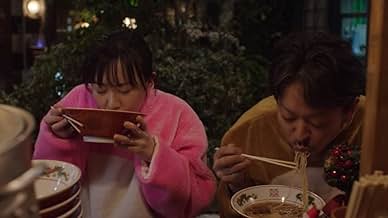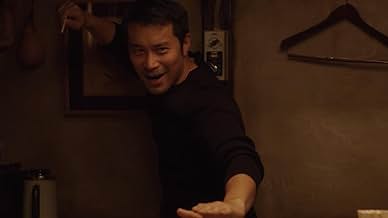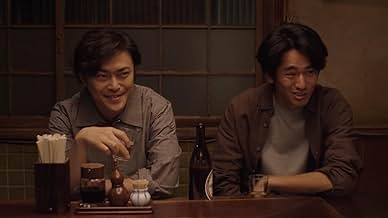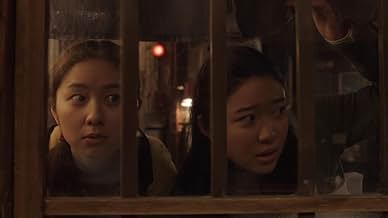CALIFICACIÓN DE IMDb
8.4/10
5.3 k
TU CALIFICACIÓN
Una antología de historias de relaciones humanas conectadas por la única cafetería abierta de madrugada que frecuentan los personajes. El propietario/chef suele facilitar las soluciones.Una antología de historias de relaciones humanas conectadas por la única cafetería abierta de madrugada que frecuentan los personajes. El propietario/chef suele facilitar las soluciones.Una antología de historias de relaciones humanas conectadas por la única cafetería abierta de madrugada que frecuentan los personajes. El propietario/chef suele facilitar las soluciones.
Explorar episodios
Opiniones destacadas
This show grows on you immediately from the first episode. The stories of the diner's patrons are grounded in such humble reality that it's not difficult to imagine why this was a hit overseas. I quiver in anticipation should this wonderful series be renewed for a second season (do it Netflix! Please!). Watching it is as satisfying as one of Master's dishes. The direction, the cast, the sets leave absolutely nothing to be desired. It easily ranks among my favorite TV series and I still have two episodes to go - but I'm savoring them.
As someone who doesn't speak or understand any Japanese, has never been to Japan and knows virtually nothing about the culture, this series charmed the hell out of me. It's as beautifully shot as it is scored, and it really does have a feeling of craftsmanship about it. The premise - an anthology of human stories, linked together by a graveyard shift diner hidden away in the midst of Shinjuku that caters to both a cast of regulars and one-off visitors - and the construction of each individual tale is charming without falling too far into twee familiarity, and each story is perfectly realised.
Kaoru Kobayashi towers as the quietly sympathetic Master, who will cook any dish for anyone, so long as they bring him the ingredients... which gives the show its neat device of theming each episode around a particular recipe. Whether as a symbol of or conduit for togetherness, comfort, romantic or familial relationships, or a Proust-like trigger for bittersweet memories that can never be entirely recaptured, food provides a delicately illustrated metaphor throughout the series.
The issues that the Master's customers face are frequently weighty and almost always universal, but the tone is light enough to take it all in stride and, if the characters feel like archetypes, it's because they're meant to be drawn broadly. Part of the show's whole concept is, just like the remembered taste of a childhood delicacy, to evoke a sense of otherworldly nostalgia - to create something unreal in the liminal space of midnight, in the idea of an oasis untouched by the city; the otherness that strips away illusion - and that evokes feelings rather than the realism of minutiae.
Perhaps the show is at its least successful when it dips into magic realism, but at its core this is a collection of great stories, told well and seasoned with enough humour and enough pathos to satisfy any appetite.
Kaoru Kobayashi towers as the quietly sympathetic Master, who will cook any dish for anyone, so long as they bring him the ingredients... which gives the show its neat device of theming each episode around a particular recipe. Whether as a symbol of or conduit for togetherness, comfort, romantic or familial relationships, or a Proust-like trigger for bittersweet memories that can never be entirely recaptured, food provides a delicately illustrated metaphor throughout the series.
The issues that the Master's customers face are frequently weighty and almost always universal, but the tone is light enough to take it all in stride and, if the characters feel like archetypes, it's because they're meant to be drawn broadly. Part of the show's whole concept is, just like the remembered taste of a childhood delicacy, to evoke a sense of otherworldly nostalgia - to create something unreal in the liminal space of midnight, in the idea of an oasis untouched by the city; the otherness that strips away illusion - and that evokes feelings rather than the realism of minutiae.
Perhaps the show is at its least successful when it dips into magic realism, but at its core this is a collection of great stories, told well and seasoned with enough humour and enough pathos to satisfy any appetite.
10redafiz
Each episode have its own story which is beautiful and heartwarming. I wish to know more about the master, how he open the diner at the beginning, his own background story, why is he still single (he must have his own family tho).. The master looks so mature, he knows everything.. Wish I have someone like him to talk to..
I dont even skip the intro, the soundtrack and masters voice is sooooooo soothing... Makes me feel relief...
I dont even skip the intro, the soundtrack and masters voice is sooooooo soothing... Makes me feel relief...
10budanome
Imperfect characters acting in virtuous ways. Portrayed by actors that come across as genuine and real. Wonderful music, reminds me of traditional American folk. Authentic Japanese values and culture presented, according to my Japanese couch buddy.
Midnight Diner: Tokyo Stories (Japanese: Shinya shokudo) (2016)
Creator: Yaro Abe
Watched: September 2018
Rating: 8/10
"When people finish their day and hurry home, my day starts. My diner is open from midnight to seven in the morning. They call it "Midnight Diner". Pork Miso Soup, Beer, Sake, Shochu. That's all I have on my menu. But I make whatever customers request, as long as I have the ingredients for it. That's my policy.Do I even have customers? More than you would expect."
Not sure what Master is talking about! An intimate 12 seat Izakaya in the Shinjuku, Tokyo district with custom made scrumptious eats served during nocturnal hours? Seems like a dream of a place. Called simply "Meshiya", Japanese for "Diner", it would certainly be one of those unassuming hole-in-the-wall hidden gems that become a home away from home; a refuge of sorts. A night owl foodie lover of stories, this is somewhere I, for one, would undoubtedly frequent.
Anthology style episodes. (Although Japan has its own adaptations, in the form of both show(s) and a feature length film.) Quite ingenious how one particular dish of food (as indicated in episode title) is creatively integrated as a motif in the story, but does not become contrived or overwhelm as the centerpiece. Artfully and subtly exemplifies how good food, especially lovingly prepared, can be an anodyne and nutriment for not only our bodies but our minds.
"People finish their day and hurry home. but sometimes they don't want to go straight back home. So, they drop in somewhere else on the way home."
Who is Master? Nameless and storyless. (He has s prominent scar, though. Oh how I want to know his story. Guess I have to investigate the manga this show is based on.) Therapist. (Like any good therapist, he listens more than he talks, but when he speaks, one should pay attention, for it is usually good advice or a thoughtful question.) Storyteller. (Narrates and tells us what happens sometimes rather than show.) Nourisher. (Serves you what always turns out to be comfortable food, and for better or worse, alcohol. Although he does have a three drink maximum rule.) Observer. (He can be seen standing and waiting, listening surreptitiously, behind the kitchen curtain before coming out with the beer or food.) Mediator. (He remains impartial- though not disinterested- in the arguments that take place in his diner and sends any heightened altercations outside.)
There are some regulars at the Midnight Diner, including: the three (annoying) girls that gossip and are akin to a Greek Chorus; Chu, an elderly man always wearing a baseball cap who gambles at the horse races and has an affinity for alcohol, the younger man always seen with him; Kosuzu, the cross-dressing owner; and the almost adorably awkward police officer. But, for the most part, each episode introduces a new character or characters in their own bite-sized story, never to appear again.
The show was not perfect, though. First, the stories themselves were all rather kosher. While it was nice to see the genuine slice of life aspect, the show would have benefited from a few risks. Stories were not boring, but a little lulling at times. Secondly, there was a noticeable gaping void where Master's story should have been. Whether an oversight or intentional mysterious angle, it really did not work here. Also, the folksy soundtrack often does not quite suit what was being seen. One wishes that they invested more in what could be the extra ingredient this show needed.
As is not uncommon in Eastern Cinema (based in theater and therefore less concerned with that fourth wall), the featured characters say "Goodnight" to us. Credits roll- a recommended extra couple minutes for the endearing stills of the episode's eponymous dish and various outtakes. And the "This Story is Fiction" shot, taken in a different seeing for each episode.
All in all, a delightful series that needs some more episodes readily available. Perfect as the amuse-bouche or even appetizers, but not quite ready for Michelin Stars.
"When people finish their day and hurry home, my day starts. My diner is open from midnight to seven in the morning. They call it "Midnight Diner". Pork Miso Soup, Beer, Sake, Shochu. That's all I have on my menu. But I make whatever customers request, as long as I have the ingredients for it. That's my policy.Do I even have customers? More than you would expect."
Not sure what Master is talking about! An intimate 12 seat Izakaya in the Shinjuku, Tokyo district with custom made scrumptious eats served during nocturnal hours? Seems like a dream of a place. Called simply "Meshiya", Japanese for "Diner", it would certainly be one of those unassuming hole-in-the-wall hidden gems that become a home away from home; a refuge of sorts. A night owl foodie lover of stories, this is somewhere I, for one, would undoubtedly frequent.
Anthology style episodes. (Although Japan has its own adaptations, in the form of both show(s) and a feature length film.) Quite ingenious how one particular dish of food (as indicated in episode title) is creatively integrated as a motif in the story, but does not become contrived or overwhelm as the centerpiece. Artfully and subtly exemplifies how good food, especially lovingly prepared, can be an anodyne and nutriment for not only our bodies but our minds.
"People finish their day and hurry home. but sometimes they don't want to go straight back home. So, they drop in somewhere else on the way home."
Who is Master? Nameless and storyless. (He has s prominent scar, though. Oh how I want to know his story. Guess I have to investigate the manga this show is based on.) Therapist. (Like any good therapist, he listens more than he talks, but when he speaks, one should pay attention, for it is usually good advice or a thoughtful question.) Storyteller. (Narrates and tells us what happens sometimes rather than show.) Nourisher. (Serves you what always turns out to be comfortable food, and for better or worse, alcohol. Although he does have a three drink maximum rule.) Observer. (He can be seen standing and waiting, listening surreptitiously, behind the kitchen curtain before coming out with the beer or food.) Mediator. (He remains impartial- though not disinterested- in the arguments that take place in his diner and sends any heightened altercations outside.)
There are some regulars at the Midnight Diner, including: the three (annoying) girls that gossip and are akin to a Greek Chorus; Chu, an elderly man always wearing a baseball cap who gambles at the horse races and has an affinity for alcohol, the younger man always seen with him; Kosuzu, the cross-dressing owner; and the almost adorably awkward police officer. But, for the most part, each episode introduces a new character or characters in their own bite-sized story, never to appear again.
The show was not perfect, though. First, the stories themselves were all rather kosher. While it was nice to see the genuine slice of life aspect, the show would have benefited from a few risks. Stories were not boring, but a little lulling at times. Secondly, there was a noticeable gaping void where Master's story should have been. Whether an oversight or intentional mysterious angle, it really did not work here. Also, the folksy soundtrack often does not quite suit what was being seen. One wishes that they invested more in what could be the extra ingredient this show needed.
As is not uncommon in Eastern Cinema (based in theater and therefore less concerned with that fourth wall), the featured characters say "Goodnight" to us. Credits roll- a recommended extra couple minutes for the endearing stills of the episode's eponymous dish and various outtakes. And the "This Story is Fiction" shot, taken in a different seeing for each episode.
All in all, a delightful series that needs some more episodes readily available. Perfect as the amuse-bouche or even appetizers, but not quite ready for Michelin Stars.
¿Sabías que…?
- TriviaThis is the first season of the Midnight Diner franchise that broadcasted on Netflix with the sub-title Tokyo Stories after Netflix failed to acquire the license of the first three seasons of this franchise.
- ConexionesVersion of Shinya shokudô (2009)
Selecciones populares
Inicia sesión para calificar y agrega a la lista de videos para obtener recomendaciones personalizadas
Detalles
- Fecha de lanzamiento
- País de origen
- Sitios oficiales
- Idioma
- También se conoce como
- Midnight Diner: Tokyo Stories
- Productora
- Ver más créditos de la compañía en IMDbPro
- Tiempo de ejecución24 minutos
- Color
- Relación de aspecto
- 1.78 : 1
Contribuir a esta página
Sugiere una edición o agrega el contenido que falta

























